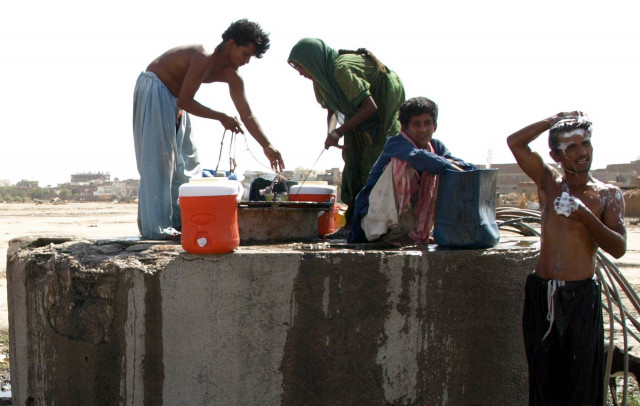Pumped dry: Water table dangerously low in Lahore
Experts stress the need for replenishing ground water

Experts stress the need for replenishing ground water. PHOTO: FILE.
WWF-Pakistan Water Security and Stewardship Manager Ali Husnain says that the solution to the problem lies in rainwater harvesting.“It can help reduce the impact of massive urbanisation.However, political will and legislation is required for groundwater recharge,” he says.
Husnain says that rainwater harvesting has been made compulsory for every buildingin the Indian state of Tamil Nadu. “In Pune (in Maharashtra), rainwater harvesting is mandatory for all new housing societies. It has produced excellent results within five years,” he says.
Rainwater harvesting is also being practiced in Sri Lanka, China, Brazil, South Africa, the USA and the UK, he says. He says that the expenditure on setting up a rainwater reservoir ranges from a few thousand rupees to a hundred thousand depending on the surface that needs to be covered.
Rainwater harvesting is the collection and deposition of rainwater for reuse on-site, rather than allowing it to go down the drain. The water is then used for livestock, irrigation and domestic purposes after treatment.
Husnain says groundwater is fast running out. “Pakistan is one of the most water-stressed countries in the world.Itis rapidly heading towards becoming a water-scarce country now. The per capita water availability has dropped below 1,000 cubic metres as compared to 5,650 cubic metres in 1947. In India, water availability per person is around 1,600 cubic metres.In major European countries,it is twice as much,” he says.
Water and Sanitation Agency (WASA) spokesman Imtiaz Mujtaba Ghauri says massive urbanisation has upset the natural groundwater recharging cycle. “Buildings,roads and concrete pavementshave blocked the groundwater recharge system in densely populated areas. Open spaces, parks and unpaved land are necessary to getthe water underground,” he says.
A recent study by WWF-Pakistan titled: Situation Analysis of the Water Resources of Lahore points out that excessive pumping is one of the main reasons behind this. “In the absence of a municipal water act or water-rights law, groundwater is being pumped ruthlessly by industries and private housing schemes,” it states.
The study estimates water pumped out for domestic, industrial and commercial purposes to be 3.79, 0.92 and 0.77 million-cubic-metres (MCM) a day, respectively. The WASA supplies water to most urban areas.The Lahore Cantonment Board, the Walton Cantonment Board, the Defence Housing Authority, the Model Town Society, the Pakistan Railways and a large number of other private housing schemes supply water toresidents in areas managed by them.
The study shows that private housing societies in the provincial capital pump 0.37 million-cubic-metres (MCM) per day. In areas lacking municipal water, the estimated extraction is 0.35 MCM/day.It means that the total groundwater extracted by private housing schemes or householdsis approximately 0.71 MCM/day.
The Public Health Engineering Department (PHED) runs water supply schemes in the district’s rural areas. The data shows that the total domestic water consumption in Lahore is 1,384 MCM per annum.
Published in The Express Tribune, August 9th, 2015.


















COMMENTS
Comments are moderated and generally will be posted if they are on-topic and not abusive.
For more information, please see our Comments FAQ